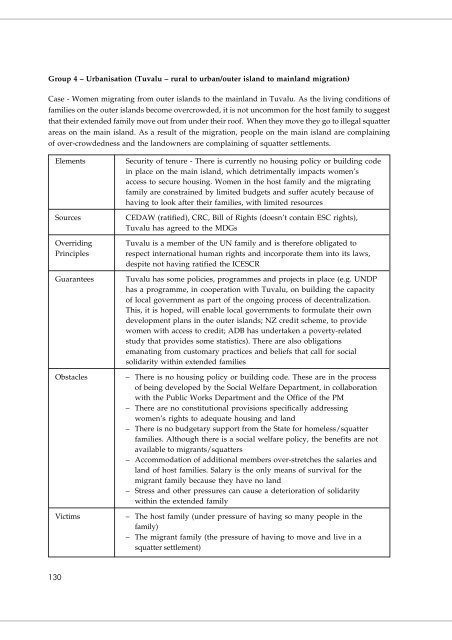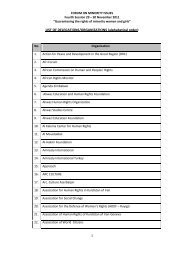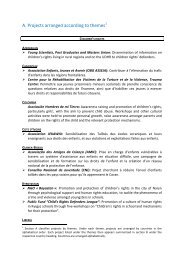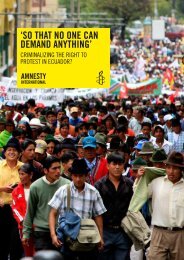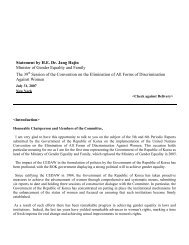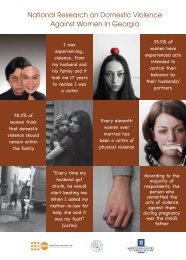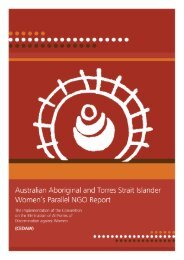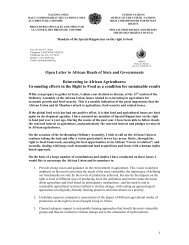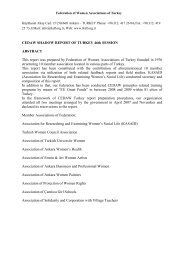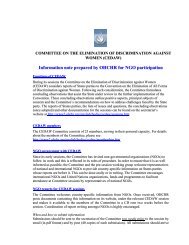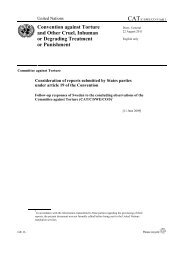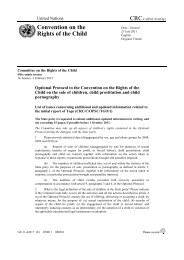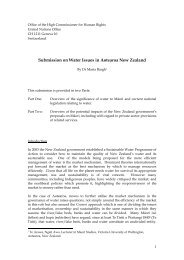Report - Office of the High Commissioner on Human Rights
Report - Office of the High Commissioner on Human Rights
Report - Office of the High Commissioner on Human Rights
- No tags were found...
You also want an ePaper? Increase the reach of your titles
YUMPU automatically turns print PDFs into web optimized ePapers that Google loves.
Group 4 – Urbanisati<strong>on</strong> (Tuvalu – rural to urban/outer island to mainland migrati<strong>on</strong>)<br />
Case - Women migrating from outer islands to <str<strong>on</strong>g>the</str<strong>on</strong>g> mainland in Tuvalu. As <str<strong>on</strong>g>the</str<strong>on</strong>g> living c<strong>on</strong>diti<strong>on</strong>s <str<strong>on</strong>g>of</str<strong>on</strong>g><br />
families <strong>on</strong> <str<strong>on</strong>g>the</str<strong>on</strong>g> outer islands become overcrowded, it is not uncomm<strong>on</strong> for <str<strong>on</strong>g>the</str<strong>on</strong>g> host family to suggest<br />
that <str<strong>on</strong>g>the</str<strong>on</strong>g>ir extended family move out from under <str<strong>on</strong>g>the</str<strong>on</strong>g>ir ro<str<strong>on</strong>g>of</str<strong>on</strong>g>. When <str<strong>on</strong>g>the</str<strong>on</strong>g>y move <str<strong>on</strong>g>the</str<strong>on</strong>g>y go to illegal squatter<br />
areas <strong>on</strong> <str<strong>on</strong>g>the</str<strong>on</strong>g> main island. As a result <str<strong>on</strong>g>of</str<strong>on</strong>g> <str<strong>on</strong>g>the</str<strong>on</strong>g> migrati<strong>on</strong>, people <strong>on</strong> <str<strong>on</strong>g>the</str<strong>on</strong>g> main island are complaining<br />
<str<strong>on</strong>g>of</str<strong>on</strong>g> over-crowdedness and <str<strong>on</strong>g>the</str<strong>on</strong>g> landowners are complaining <str<strong>on</strong>g>of</str<strong>on</strong>g> squatter settlements.<br />
Elements<br />
Sources<br />
Overriding<br />
Principles<br />
Guarantees<br />
Obstacles<br />
Victims<br />
Security <str<strong>on</strong>g>of</str<strong>on</strong>g> tenure - There is currently no housing policy or building code<br />
in place <strong>on</strong> <str<strong>on</strong>g>the</str<strong>on</strong>g> main island, which detrimentally impacts women’s<br />
access to secure housing. Women in <str<strong>on</strong>g>the</str<strong>on</strong>g> host family and <str<strong>on</strong>g>the</str<strong>on</strong>g> migrating<br />
family are c<strong>on</strong>strained by limited budgets and suffer acutely because <str<strong>on</strong>g>of</str<strong>on</strong>g><br />
having to look after <str<strong>on</strong>g>the</str<strong>on</strong>g>ir families, with limited resources<br />
CEDAW (ratified), CRC, Bill <str<strong>on</strong>g>of</str<strong>on</strong>g> <strong>Rights</strong> (doesn’t c<strong>on</strong>tain ESC rights),<br />
Tuvalu has agreed to <str<strong>on</strong>g>the</str<strong>on</strong>g> MDGs<br />
Tuvalu is a member <str<strong>on</strong>g>of</str<strong>on</strong>g> <str<strong>on</strong>g>the</str<strong>on</strong>g> UN family and is <str<strong>on</strong>g>the</str<strong>on</strong>g>refore obligated to<br />
respect internati<strong>on</strong>al human rights and incorporate <str<strong>on</strong>g>the</str<strong>on</strong>g>m into its laws,<br />
despite not having ratified <str<strong>on</strong>g>the</str<strong>on</strong>g> ICESCR<br />
Tuvalu has some policies, programmes and projects in place (e.g. UNDP<br />
has a programme, in cooperati<strong>on</strong> with Tuvalu, <strong>on</strong> building <str<strong>on</strong>g>the</str<strong>on</strong>g> capacity<br />
<str<strong>on</strong>g>of</str<strong>on</strong>g> local government as part <str<strong>on</strong>g>of</str<strong>on</strong>g> <str<strong>on</strong>g>the</str<strong>on</strong>g> <strong>on</strong>going process <str<strong>on</strong>g>of</str<strong>on</strong>g> decentralizati<strong>on</strong>.<br />
This, it is hoped, will enable local governments to formulate <str<strong>on</strong>g>the</str<strong>on</strong>g>ir own<br />
development plans in <str<strong>on</strong>g>the</str<strong>on</strong>g> outer islands; NZ credit scheme, to provide<br />
women with access to credit; ADB has undertaken a poverty-related<br />
study that provides some statistics). There are also obligati<strong>on</strong>s<br />
emanating from customary practices and beliefs that call for social<br />
solidarity within extended families<br />
– There is no housing policy or building code. These are in <str<strong>on</strong>g>the</str<strong>on</strong>g> process<br />
<str<strong>on</strong>g>of</str<strong>on</strong>g> being developed by <str<strong>on</strong>g>the</str<strong>on</strong>g> Social Welfare Department, in collaborati<strong>on</strong><br />
with <str<strong>on</strong>g>the</str<strong>on</strong>g> Public Works Department and <str<strong>on</strong>g>the</str<strong>on</strong>g> <str<strong>on</strong>g>Office</str<strong>on</strong>g> <str<strong>on</strong>g>of</str<strong>on</strong>g> <str<strong>on</strong>g>the</str<strong>on</strong>g> PM<br />
– There are no c<strong>on</strong>stituti<strong>on</strong>al provisi<strong>on</strong>s specifically addressing<br />
women’s rights to adequate housing and land<br />
– There is no budgetary support from <str<strong>on</strong>g>the</str<strong>on</strong>g> State for homeless/squatter<br />
families. Although <str<strong>on</strong>g>the</str<strong>on</strong>g>re is a social welfare policy, <str<strong>on</strong>g>the</str<strong>on</strong>g> benefits are not<br />
available to migrants/squatters<br />
– Accommodati<strong>on</strong> <str<strong>on</strong>g>of</str<strong>on</strong>g> additi<strong>on</strong>al members over-stretches <str<strong>on</strong>g>the</str<strong>on</strong>g> salaries and<br />
land <str<strong>on</strong>g>of</str<strong>on</strong>g> host families. Salary is <str<strong>on</strong>g>the</str<strong>on</strong>g> <strong>on</strong>ly means <str<strong>on</strong>g>of</str<strong>on</strong>g> survival for <str<strong>on</strong>g>the</str<strong>on</strong>g><br />
migrant family because <str<strong>on</strong>g>the</str<strong>on</strong>g>y have no land<br />
– Stress and o<str<strong>on</strong>g>the</str<strong>on</strong>g>r pressures can cause a deteriorati<strong>on</strong> <str<strong>on</strong>g>of</str<strong>on</strong>g> solidarity<br />
within <str<strong>on</strong>g>the</str<strong>on</strong>g> extended family<br />
– The host family (under pressure <str<strong>on</strong>g>of</str<strong>on</strong>g> having so many people in <str<strong>on</strong>g>the</str<strong>on</strong>g><br />
family)<br />
– The migrant family (<str<strong>on</strong>g>the</str<strong>on</strong>g> pressure <str<strong>on</strong>g>of</str<strong>on</strong>g> having to move and live in a<br />
squatter settlement)<br />
130 WOMEN’S RIGHTS TO ADEQUATE HOUSEING AND LAND


